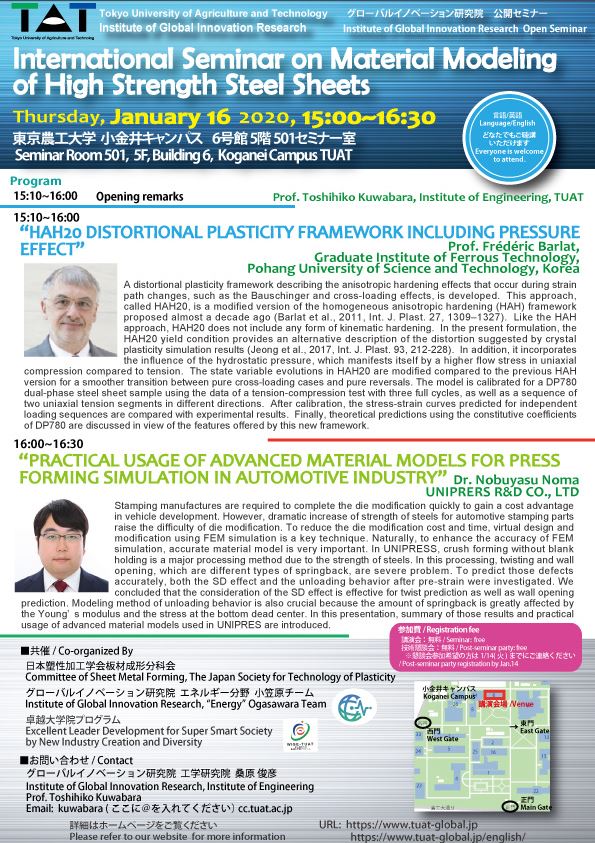Event
【GIR Open Seminar】 Dr. Frédéric Barlat / Pohang University of Science and Technology, Korea ”International Seminar on Material Modeling of High Strength Steel Sheets”

| Date | 2020.1.16 (15:00 - 16:30) |
|---|---|
| Venue | |
| Title | 【International Seminar on Material Modeling of High Strength Steel Sheets】 【Registration Fee】 - Seminar: Free - Post-seminar Party: Free (Registration is required. Please contact Prof. Kuwabara by January 14, 2020) 【Program】 ◆15:00-15:10 Opening remarks : Toshihiko Kuwabara (Professor, Institute of Engineering, TUAT) ◆15:10-16:00 Frédéric Barlat (Professor, Graduate Institute of Ferrous Technology, Pohang University of Science and Technology, Korea) “HAH20 DISTORTIONAL PLASTICITY FRAMEWORK INCLUDING PRESSURE EFFECT” <Abstract> A distortional plasticity framework describing the anisotropic hardening effects that occur during strain path changes, such as the Bauschinger and cross-loading effects, is developed. This approach, called HAH20, is a modified version of the homogeneous anisotropic hardening (HAH) framework proposed almost a decade ago (Barlat et al., 2011, Int. J. Plast. 27, 1309–1327). Like the HAH approach, HAH20 does not include any form of kinematic hardening. In the present formulation, the HAH20 yield condition provides an alternative description of the distortion suggested by crystal plasticity simulation results (Jeong et al., 2017, Int. J. Plast. 93, 212-228). In addition, it incorporates the influence of the hydrostatic pressure, which manifests itself by a higher flow stress in uniaxial compression compared to tension. The state variable evolutions in HAH20 are modified compared to the previous HAH version for a smoother transition between pure cross-loading cases and pure reversals. The model is calibrated for a DP780 dual-phase steel sheet sample using the data of a tension-compression test with three full cycles, as well as a sequence of two uniaxial tension segments in different directions. After calibration, the stress-strain curves predicted for independent loading sequences are compared with experimental results. Finally, theoretical predictions using the constitutive coefficients of DP780 are discussed in view of the features offered by this new framework. ◆16:00-16:30 Nobuyasu Noma (UNIPRERS R&D CO., LTD.) "PRACTICAL USAGE OF ADVANCED MATERIAL MODELS FOR PRESS FORMING SIMULATION IN AUTOMOTIVE INDUSTRY" <Abstract> Stamping manufactures are required to complete the die modification quickly to gain a cost advantage in vehicle development. However, dramatic increase of strength of steels for automotive stamping parts raise the difficulty of die modification. To reduce the die modification cost and time, virtual design and modification using FEM simulation is a key technique. Naturally, to enhance the accuracy of FEM simulation, accurate material model is very important. In UNIPRESS, crush forming without blank holding is a major processing method due to the strength of steels. In this processing, twisting and wall opening, which are different types of springback, are severe problem. To predict those defects accurately, both the SD effect and the unloading behavior after pre-strain were investigated. We concluded that the consideration of the SD effect is effective for twist prediction as well as wall opening prediction. Modeling method of unloading behavior is also crucial because the amount of springback is greatly affected by the Young’s modulus and the stress at the bottom dead center. In this presentation, summary of those results and practical usage of advanced material models used in UNIPRES are introduced. |
| Language | English |
| Intended for | Everyone is welcome to attend. |
| Co-Organized by | Committee of Sheet Metal Forming, The Japan Society for Technology of Plasticity Institute of Global Innovation, "Energy" Ogasawara Team Excellent Leader Development for Super Smart Society by New Industry Creation and Diversity |
| Outline | |
| Contact | Institute of Global Innovation Research, Institute of Engineering Prof. Toshihiko Kuwabara e-mail: kuwabara (at) cc.tuat.ac.jp |
このページの上部へ